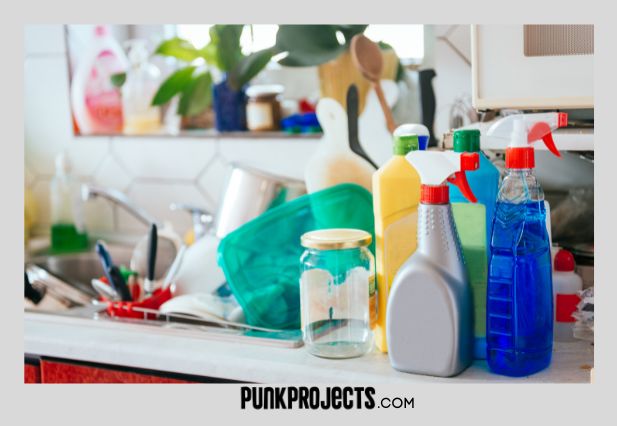Are you annoyed by the presence of ants in your bathroom and want to know how to get rid of ants in bathroom? It can be quite irritating to have these small intruders invading your personal space. But don’t worry! I’m here to give you effective strategies to permanently eliminate ants in your bathroom.
In this detailed guide, we will explore different methods that will help you regain control over your bathroom from these annoying pests. Are you prepared to tackle the task of getting rid of ants from your bathroom? Let’s jump right in and discover the best solutions together!

Understanding the problem:
Ants in the bathroom can be a real pain. They invade our personal space, causing hassle and annoyance. Knowing the issue is key to solving it.
Why are ants in your bathroom? A few reasons:
- They love moisture, and bathrooms offer the perfect habitat.
- They might be looking for food or a place to stay, so they enter through crevices and openings.
To deal with this, you need to:
- Locate the ant trails and entry points. By finding out where they’re coming from, you can find the areas that need attention.
- Seal off any openings to stop them from getting in and coming back.
Also, you need to keep your bathroom clean and hygienic. Clean surfaces and get rid of any food or toiletries leftovers to stop the ants from being attracted.
You can also use natural deterrents, like vinegar or lemon juice, to repel the ants. These substances mess up their sense of smell, while being safe for people and animals. Additionally, you can buy commercial ant baits or traps made for indoors, that can effectively get rid of them.
Prevention methods
Keep your bathroom clean and dry, seal cracks and gaps, use airtight containers, dispose of trash correctly, and remove wet towels or clothes. Interesting fact: vinegar is known to repel ants due to its strong odor.
Wipe down surfaces with a solution of vinegar and water to keep them away. Plus, take note of underlying issues – for instance, my friend had an ant infestation for months until she realized the root cause was a leaking pipe behind the wall! Stay vigilant and keep ants out of your sanctuary!
Natural remedies
Natural remedies are an effective and safe alternative to chemical pesticides for getting rid of ants in the bathroom. These natural solutions won’t hurt your health or environment.

Here’s a table of natural remedies to deal with bathroom ants:
| Remedy | Description |
|---|---|
| Vinegar | Makes a strong smell that repels ants and messes up their pheromone trails. vinegar for ants in bathroom |
| Peppermint oil | Its strong smell keeps ants away. |
| Cinnamon | Sprinkle cinnamon on ant trails or entry points to discourage them from entering. |
| Borax | Mix borax, sugar, and water to make a bait that kills ants when they eat it. |
| Lemon juice | Lemons contain citric acid which messes up ants’ scent trail and deters them. |
Furthermore, seal any cracks or openings in walls, floors, or windows to stop more ants from coming in.
Chemical solutions
Chemical solutions can be great for ridding the bathroom of ants. Here are some popular methods:
- Boric acid mixed with sugar is an effective ant killer. The ants are attracted to the sweet scent, but the boric acid is poisonous and kills them off.
- Diatomaceous earth is another chemical solution. It’s a natural substance which is safe for humans and pets, but deadly to ants.
- Vinegar has a strong smell and can be used to deter ants. Spray it on their trails and entry points to make them avoid the area.
- Using ant baits with borax or hydramethylnon can eliminate ants. The bait is laced with poison that the ants carry back to their colony, slowly wiping it out.
Safety is important! Keep these chemicals away from children and animals.
When nothing else works, it’s time to call the professionals. Pest control with a license, a flamethrower, and great accuracy is the sure-fire way to get rid of ants in the bathroom.
Hiring professional pest control

Ant infestations can quickly get out of hand in your bathroom. Professional pest control can be the answer. Here are the benefits:
- Professionals have expertise. They know how to get rid of ants.
- Customized treatment plans tailored to your needs.
- Safety measures are taken to protect you and your family.
- Long-term solutions stop future ant invasions.
- Time-saving option for fast removal.
How to get rid of ants in drain
To get rid of ants in your shower drain, follow these steps:
- Clean the drain using a mixture of equal parts vinegar and water or a mild detergent to remove any food particles or residue that may be attracting the ants.
- Pour boiling water down the drain to flush out any remaining ants and disrupt their nesting sites.
- Use a combination of half a cup of baking soda followed by half a cup of vinegar to create a fizzy reaction in the drain. Let it sit for a few minutes, then flush with hot water to dislodge ant colonies.
- Consider using ant bait stations near the affected drain. The ants will be attracted to the bait and carry it back to their nest, eliminating the entire colony.
- Seal any entry points like shower glass rubber seal around the drain using caulk or silicone sealant to prevent ants from reentering.
- Maintain regular cleanliness and avoid pouring substances like grease or oil down the drain, as they can attract ants.
By following these steps, you can effectively eliminate ants from your drain and prevent further infestations.
How to get rid of ants in shower
Here’s a condensed version with a list of steps to get rid of ants in your shower:
- Identify and seal entry points.
- Thoroughly clean the shower area.
- Remove food sources and keep the area clean.
- Use natural deterrents like cinnamon or citrus peels.
- Monitor and repeat the steps if needed.
- Consider seeking professional help for persistent infestations.
By following these steps, you can effectively eliminate ants from your shower and prevent future invasions.
Conclusion
Eliminate ants from your bathroom with these strategies!
- Seal entry points
- Keep your bathroom dry and clean
- Use natural repellents
Block off their access points such as gaps around windows, cracks in walls or floors, and plumbing openings. Keep moisture away by fixing plumbing issues and wiping wet surfaces. Natural repellents like vinegar, citrus sprays, and essential oils like peppermint or tea tree oil can also repel ants. Use ant baits to get rid of existing infestations. Maintain a clean and dry environment and say goodbye to those pesky ants!
Frequently Asked Questions: How To Get Rid of Ants in Bathroom
What attracts ants to the bathroom?
Ants are attracted to the bathroom due to the presence of moisture, water sources, and potential food particles. They often find their way through cracks, pipes, or drains.
How can I locate the ant nest in my bathroom?
Locating ant nests can be challenging, but look for trails of ants or follow their movement to find the entry point. Nests are commonly found in wall voids, under sinks, behind baseboards, or near water sources.
Are there any natural remedies to eliminate ants from the bathroom?
Yes, several natural remedies can help eliminate ants from the bathroom. These include using lemon juice, vinegar, peppermint oil, or a mixture of borax and sugar to disrupt their trails and discourage their presence.
How can I prevent ants from entering my bathroom?
To prevent ants from entering your bathroom, ensure proper sealing of cracks and crevices, fix any leaks, regularly clean up food remains, and use ant traps or deterrents near the entry points.
When should I consider professional pest control for ant infestation?
If the infestation persists despite your efforts, it may be time to call a professional pest control service. They have the expertise and specialized equipment to effectively tackle severe ant infestations.
Are ants in the bathroom harmful?
Most ants found in bathrooms, like the common garden ant, are not harmful. However, certain species can bite or sting. Additionally, their presence can indicate underlying hygiene or structural issues that should be addressed.
I am a multi-talented designer and contractor with over 10 years of experience in the field. I have a passion for creating beautiful, innovative spaces that reflect my clients’ needs and styles. My skills include architectural design, interior design, space planning, project management and construction supervision.






